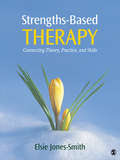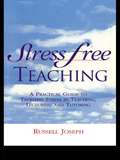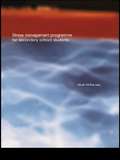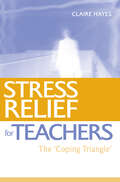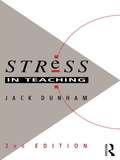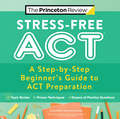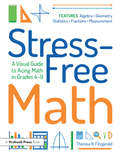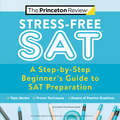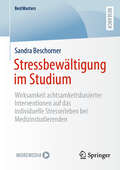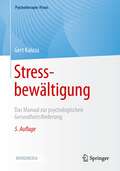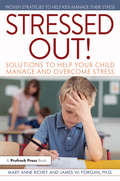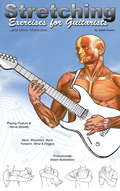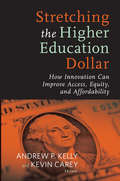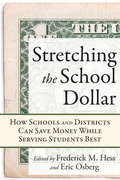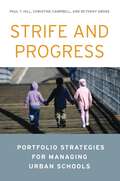- Table View
- List View
Strengths-Based Teaching and Learning in Mathematics: Five Teaching Turnarounds for Grades K-6 (Corwin Mathematics Series)
by Beth McCord Kobett Karen S. Karp"This book is a game changer! Strengths-Based Teaching and Learning in Mathematics: 5 Teaching Turnarounds for Grades K- 6 goes beyond simply providing information by sharing a pathway for changing practice. . . Focusing on our students’ strengths should be routine and can be lost in the day-to-day teaching demands. A teacher using these approaches can change the trajectory of students’ lives forever. All teachers need this resource! Connie S. Schrock Emporia State University National Council of Supervisors of Mathematics President, 2017-2019 NEW COVID RESOURCES ADDED: A Parent’s Toolkit to Strengths-Based Learning in Math is now available on the book’s companion website to support families engaged in math learning at home. This toolkit provides a variety of home-based activities and games for families to engage in together. Your game plan for unlocking mathematics by focusing on students’ strengths. We often evaluate student thinking and their work from a deficit point of view, particularly in mathematics, where many teachers have been taught that their role is to diagnose and eradicate students’ misconceptions. But what if instead of focusing on what students don’t know or haven’t mastered, we identify their mathematical strengths and build next instructional steps on students’ points of power? Beth McCord Kobett and Karen S. Karp answer this question and others by highlighting five key teaching turnarounds for improving students’ mathematics learning: identify teaching strengths, discover and leverage students’ strengths, design instruction from a strengths-based perspective, help students identify their points of power, and promote strengths in the school community and at home. Each chapter provides opportunities to stop and consider current practice, reflect, and transfer practice while also sharing · Downloadable resources, activities, and tools · Examples of student work within Grades K–6 · Real teachers’ notes and reflections for discussion It’s time to turn around our approach to mathematics instruction, end deficit thinking, and nurture each student’s mathematical strengths by emphasizing what makes them each unique and powerful.
Strengths-Based Teaching and Learning in Mathematics: Five Teaching Turnarounds for Grades K-6 (Corwin Mathematics Series)
by Beth McCord Kobett Karen S. Karp"This book is a game changer! Strengths-Based Teaching and Learning in Mathematics: 5 Teaching Turnarounds for Grades K- 6 goes beyond simply providing information by sharing a pathway for changing practice. . . Focusing on our students’ strengths should be routine and can be lost in the day-to-day teaching demands. A teacher using these approaches can change the trajectory of students’ lives forever. All teachers need this resource! Connie S. Schrock Emporia State University National Council of Supervisors of Mathematics President, 2017-2019 NEW COVID RESOURCES ADDED: A Parent’s Toolkit to Strengths-Based Learning in Math is now available on the book’s companion website to support families engaged in math learning at home. This toolkit provides a variety of home-based activities and games for families to engage in together. Your game plan for unlocking mathematics by focusing on students’ strengths. We often evaluate student thinking and their work from a deficit point of view, particularly in mathematics, where many teachers have been taught that their role is to diagnose and eradicate students’ misconceptions. But what if instead of focusing on what students don’t know or haven’t mastered, we identify their mathematical strengths and build next instructional steps on students’ points of power? Beth McCord Kobett and Karen S. Karp answer this question and others by highlighting five key teaching turnarounds for improving students’ mathematics learning: identify teaching strengths, discover and leverage students’ strengths, design instruction from a strengths-based perspective, help students identify their points of power, and promote strengths in the school community and at home. Each chapter provides opportunities to stop and consider current practice, reflect, and transfer practice while also sharing · Downloadable resources, activities, and tools · Examples of student work within Grades K–6 · Real teachers’ notes and reflections for discussion It’s time to turn around our approach to mathematics instruction, end deficit thinking, and nurture each student’s mathematical strengths by emphasizing what makes them each unique and powerful.
Strengths-Based Therapy: Connecting Theory, Practice and Skills
by Elsie Jones-SmithCombining both the theory and practice of strengths-based therapy, Elsie Jones-Smith introduces current and future practitioners to the modern approach of practice—presenting a model for treatment as well as demonstrations in clinical practice across a variety of settings. This highly effective form of therapy supports the idea that clients know best about what has worked and has not worked in their lives, helps them discover positive and effective solutions through their own experiences, and allows therapists to engage their clients in their own therapy. Drawing from cutting-edge research in neuroscience, positive emotions, empowerment, and change, Strengths-Based Therapy helps readers understand how to get their clients engaged as active participants in treatment.
Stress Free Teaching: A Practical Guide to Tackling Stress in Teaching, Lecturing and Tutoring
by Russell JosephThis manual provides advice on dealing with stress in teaching. It seeks to combine self-help guidance with a core of professional reality to provide solutions that are effective and tailored to the demands of the educational sector. There are case studies from both the UK and abroad.
Stress Less, Achieve More: Simple Ways to Turn Pressure into a Positive Force in Your Life
by Aimee BernsteinWith greater workplace demands comes greater stress--and it's taking a toll on our productivity and well-being. The standard recommendations are to exercise, meditate, eat better. But who has time for yoga poses amid nonstop meetings and pressing deadlines? Stress reduction becomes one more thing to do! Executive coach and psychotherapist Aimee Bernstein offers a more effective and realistic approach: embrace the pressure. See it as an energy source. Tap into its flow to accomplish more while feeling calm and centered. It's a counterintuitive message that frenzied professionals can actually use. Stress Less. Achieve More. delivers relief for the overwhelmed. Part training manual, part spiritual guide, the book uncovers a total mental/physical/emotional formula to: Stop reacting defensively * Retrain natural responses to stress triggers * Resolve conflicts harmoniously * Energize fatigued teammates * Relax in difficult situations In today's overbooked world, pressure is almost impossible to avoid. But with the tips, techniques, and exercises in Stress Less. Achieve More., you can turn it into your ally--and thrive under even the most demanding circumstances.
Stress Management Programme For Secondary School Students: A Practical Resource for Schools
by Sarah McNamaraThis is a resource pack for teachers to use in classrooms to help students combat stress. As well as the theory, it presents photocopiable worksheets. The pack covers the following areas: * preparing for exams* learning study skills* building self-confidence and self-esteem* coping with relationships and family problems* diet and exercise issues. The information is presented in an accessible way and there are plenty of follow-up activities and strategies for coping. Everything is geared towards making it readable and interesting for young people without losing sight of the needs of the curriculum.
Stress Relief for Teachers: The Coping Triangle
by Claire HayesEven the best teachers can feel overwhelmed with the pressures of the job and become prone to anxiety, depression and anger. This book offers teachers an easily implemented and proven approach to dealing with these feelings in a more helpful way, enabling them to cope with taxing situations as well as the day-to-day stress of the classroom. Based on the principles of cognitive-behavioural therapy and on the author’s many years of experience, Stress Relief for Teachers is both a practical guide to feeling better and more in control, and a guide to understanding difficult feelings and how our thoughts, feelings and actions are inextricably linked.
Stress in Teaching
by Jack Dunham Dr Jack DunhamThe stress involved in a career in teaching has increased considerably in recent years. In England and Wales the implementation of the Education Reform Act has led to a whole range of organisational and curricular changes to add to the existing pressures of discipline problems, poor working conditions and low pay. Anxiety, depression, relationship difficulties and even physical illness are just some of the symptoms that result. This established guide, now wholly updated for teachers and managers in the 1990s, shows how to recognize the signs of stress and how to develop strategies to control it. Its practical advice, field-tested in numberous workshops for teachers and heads, should help scholls to reduce pressures on their staff by the development of satisfactory whole-school policies and teachers to be more effective in the management of their own stress levels.
Stress, Bewältigung und Persönlichkeit: Forschungsüberblick und Anwendungsperspektiven
by Heinz Walter KrohneDieses Buch liefert einen Brückenschlag zwischen den Erfahrungen von Menschen mit Stress und Stressbewältigung, der neuesten Forschung in diesem Bereich und den Anwendungsmöglichkeiten der Praxis. Sein wesentliches Thema ist die Bedeutung von Unterschieden zwischen Menschen im Erleben und Bewältigen von Belastungen. Daraus folgt die Notwendigkeit, die präventive und therapeutische Praxis im Hinblick auf das Erreichen einer wirksamen Stressbewältigung an diese Unterschiede anzupassen. Betrachtet man diese (relativ stabilen) Unterschiede zwischen Menschen, so ergibt sich für die Praxis eine wesentliche Konsequenz: Eine generell (also für alle Betroffenen) empfohlene und praktizierte Form der Bewältigung (z.B. Ablenkung, Entspannung, Achtsamkeit auf Prozesse im eigenen Körper) kann zwar bei bestimmten Personen hilfreich sein, bei anderen Menschen aber eher negativ wirken. So lassen sich Personen prinzipiell in zwei Gruppen einordnen: Vermeidende Personen haben die Tendenz, belastenden Ereignissen bzw. Erlebnissen aus dem Weg zu gehen, etwa indem sie die Schwere der Belastung herunterspielen oder sich gar nicht erst mit ihr befassen. Überwachern geht es hingegen darum, möglichst viel Information über eine Belastung (z.B. eine bevorstehende Operation) zu erhalten, um sich so sicherer zu fühlen und die Situation besser kontrollieren zu können. Methoden zur Messung dieser Merkmale werden beschrieben sowie Forschungen vorgestellt, die die jeweils optimale Bewältigung bei vermeidenden bzw. überwachenden Personen beschreiben. Auf der Grundlage dieser Thematik werden Möglichkeiten zur praktischen Anwendung vorgestellt, die auf Erkenntnissen aus diesen Forschungen beruhen. Dabei konzentriert sich das Buch auf drei Felder: • Gesundheit mit den beiden Themen Bewältigung und körperliche Gesundheit sowie psychologische Behandlung von Patienten bei medizinischen Eingriffen • Stressbewältigung und Leistungsverhalten • Prävention im Hinblick auf den Einfluss der Sozialisation (speziell der elterlichen Erziehung) auf die Entwicklung der Stressbewältigung beim Kind Die Zielgruppen • Studierende, Lehrende und Praktiker der (Gesundheits-)Psychologie, Sozial-, Gesundheits- und Erziehungswissenschaften, die Informationen zu hier bedeutsamen wissenschaftlichen Themen (u.a. Gesundheitsverhalten und -erziehung, Leistungsanforderungen, Sozialisationsprozesse) suchen. • Personen, die für die Bewältigung ihrer alltäglichen Belastungen das Angebot der vielen hierzu vorliegenden Ratgeber nicht befriedigt und nach auf neuesten wissenschaftlichen Erkenntnissen basierenden, Informationen suchen
Stress-Free ACT: A Step-by-Step Beginner's Guide to ACT Preparation (College Test Preparation)
by The Princeton Review8 STEPS TO ACT SUCCESS! Stress-Free ACT is a simplified, user-friendly beginner's guide to this crucial college admission test. It walks readers painlessly through the major touchpoints of their ACT journey, from getting familiar with the test, to setting a target score and figuring out how to achieve it. Worried about applying to college and have many questions about the ACT? The Princeton Review is here to help! Stress-Free ACT is your go-to orientation for everything you need to know about this test. With eight easy-to-manage steps, this book guides you through the early stages of ACT prep and your college admissions journey, anxiety-free. Inside, you'll:· Learn strategies to ace all five sections of the test (English, Math, Reading, Science, and the optional Writing section)· Discover how to research schools and plan out your testing goals· Take a mini practice ACT in the book and access a full-length practice ACT onlineThe ACT can be intimidating, but don&’t worry—this book will set you on the path to success. You might even wonder later what you were so anxious about!
Stress-Free Math: A Visual Guide to Acing Math in Grades 4-9
by Theresa R. FitzgeraldEquipped with the #1 guide to help kids (and their parents) with math homework, students will be able to quickly find the definitions and illustrated examples that will enable them to solve many of the math challenges they face. Covering everything from "addend" to "zero," Stress-Free Math:Is perfect for both kids and their parents looking for help with math homework and the tools to ace the class!Gives students in grades 4-9 more than 400 definitions, full-color illustrations, and examples.Covers subjects like measurement, algebra, geometry, fractions and decimals, statistics and probability, and problem solving.Helps students solve math problems with confidence.Is a fully updated reimagining of the best-selling Math Dictionary for Kids.This well-organized and easy-to-follow quick reference guide includes illustrated, concise explanations of the most common terms used in general math classes. Packed with strategies to help students get better grades and master math concepts without any headaches, this math study guide also discusses how students can use manipulatives and basic math tools to improve their understanding and includes handy measurement conversion tables, guides to geometric shapes, and more. Each concept covered has a concise definition and an example or illustration.Grades 4-9
Stress-Free SAT: A Step-by-Step Beginner's Guide to SAT Preparation (College Test Preparation)
by The Princeton Review8 STEPS TO SAT SUCCESS! Stress-Free SAT is a simplified, user-friendly beginner's guide to this crucial college admission test. It walks readers painlessly through the major touchpoints of their SAT journey, from getting familiar with the exam, to setting a target score and figuring out how to achieve it. Worried about applying to college and have many questions about the SAT? The Princeton Review is here to help! Stress-Free SAT is your go-to orientation for everything you need to know about this test. With eight easy-to-manage steps, this book guides you through the early stages of SAT prep and your college admissions journey, anxiety-free. Inside, you'll:· Learn strategies to ace all three sections of the test (Reading, Writing and Language, and Math)· Discover how to research schools and plan out your testing goals· Take a mini practice SAT in the book and access a full-length practice SAT onlineThe SAT can be intimidating, but don&’t worry—this book will set you on the path to success. You might even wonder later what you were so worried about!
Stress-Free Science: A Visual Guide to Acing Science in Grades 4-8
by Laurie E. WestphalEquipped with the #1 guide to help kids (and their parents) with science homework, students will be able to quickly find the definitions and illustrated examples that will enable them to solve many of the science challenges they face. Covering everything from "acceleration" to "zygote," Stress-Free Science: Is perfect for both kids and their parents looking for help with science homework and the tools to ace the class!Provides students in grades 4-8 with hundreds of science terms and kid-friendly definitions, full-color illustrations, and examples.Covers subjects like physical sciences, Earth sciences, life sciences, basic science equipment, and measurement and units.Helps students complete science tasks with confidence.Will help with any science assignment, project, or experiment.
Stressbewältigung im Studium: Wirksamkeit achtsamkeitsbasierter Interventionen auf das individuelle Stresserleben bei Medizinstudierenden (BestMasters)
by Sandra BeschornerStress und psychische Belastungen sind unter Studierenden weit verbreitet, insbesondere bei Medizinstudierenden, die aufgrund der hohen Anforderungen ihres Studiums eine erhöhte Prävalenz klinisch relevanter psychischer Störungen aufweisen. Fehlende adäquate Stressbewältigungsstrategien können langfristig zu negativen gesundheitlichen und beruflichen Konsequenzen führen. In diesem Zusammenhang gewinnen achtsamkeitsbasierte Interventionen zunehmend an Bedeutung, da sie als wirksame Methode zur Stressreduktion gelten. Im Zentrum dieses Buches steht die Untersuchung der Wirksamkeit achtsamkeitsbasierter Interventionen auf das individuelle Stresserleben von Medizinstudierenden. Besonderes Interesse gilt der Frage, inwiefern bestimmte Interventions-Rahmenbedingungen die Wirksamkeit sowie die Teilnahmebereitschaft beeinflussen.
Stressbewältigung: Das Manual zur psychologischen Gesundheitsförderung (Psychotherapie: Praxis)
by Gert KaluzaMit diesem Manual werden Sie fit für die Durchführung des psychologischen Gesundheitsförderungsprogramms: Gelassen und sicher im Stress. Es wird seit über 25 Jahren erfolgreich eingesetzt und von den gesetzlichen Krankenkassen als geprüfte Präventionsmaßnahme gefördert. In Teil I finden Sie Hintergrundwissen aus der Stressforschung: kompakt, fundiert und verständlich. Teil II enthält die Trainingsbausteine: (1) Entspannungstraining: entspannen und loslassen. (2) Mentaltraining: förderliche Denkweisen und Einstellungen entwickeln. (3) Problemlösetraining: Stresssituationen wahrnehmen, annehmen und verändern. (4) Genusstraining: erholen und genießen. (5) Ergänzungsmodule zu Stressbewältigung durch Sport und Bewegung, Pflege des sozialen Netzes, Zielklärung, gesunden Umgang mit der Zeit und der 4xA-Strategie für den Akutfall. Aus dem Inhalt: Didaktische Hinweise für eine kompetente Durchführung des Trainings – abwechslungsreiche Gestaltung durch viele praktisch erprobte Übungen – Teilnehmerunterlagen, die informieren und motivieren – alle Trainingsmaterialien stehen zum Ausdrucken online zur Verfügung. Der Autor: Prof. Dr. Gert Kaluza ist psychologischer Psychotherapeut und als Trainer, Coach und Autor im Bereich der individuellen und betrieblichen Gesundheitsförderung tätig. Nach 20jähriger Tätigkeit an Universitäten gründete er 2002 sein eigenes Fortbildungs- und Trainingsinstitut, das GKM-Institut für Gesundheitspsychologie, das er bis 2022 selbst leitete.
Stressbewältigung: Trainingsmanual zur psychologischen Gesundheitsförderung (Psychotherapie: Praxis)
by Gert KaluzaMit diesem Kursleiter-Manual werden Sie fit für die Durchführung des psychologischen Gesundheitsförderungsprogramms "Gelassen und sicher im Stress". Es wird seit über 20 Jahren erfolgreich eingesetzt und von den gesetzlichen Krankenkassen als geprüfte Präventionsmaßnahme gefördert. In Teil I finden Sie Hintergrundwissen aus der Stressforschung: kompakt, fundiert und verständlich. Teil II enthält Trainingsbausteine in 4 Trainings- und 5 Ergänzungsmodulen: (1) Entspannungstraining: entspannen und loslassen. (2) Mentaltraining: förderliche Denkweisen und Einstellungen entwickeln. (3) Problemlösetraining: Stresssituationen wahrnehmen, annehmen und verändern. (4) Genusstraining: erholen und genießen. (5) Ergänzungsmodule zu Stressbewältigung durch Sport und Bewegung, Pflege des sozialen Netzes, Zielklärung, gesunden Umgang mit der Zeit und der 4xA-Strategie für den Akutfall.Aus dem Inhalt: Didaktische Hinweise für eine kompetente Durchführung des Trainings – abwechslungsreiche Gestaltung durch viele Übungen – Teilnehmerunterlagen, die informieren und motivieren – alle Trainingsmaterialien im Buch stehen zum Ausdrucken für Teilnehmer online zur Verfügung.Der Autor: Prof. Dr. Gert Kaluza ist psychologischer Psychotherapeut und als Trainer, Coach und Autor im Bereich der individuellen und betrieblichen Gesundheitsförderung tätig. Nach über 20jähriger Tätigkeit an Universitäten gründete er 2002 sein eigenes Fortbildungs- und Trainingsinstitut, das GKM-Institut für Gesundheitspsychologie.
Stressed Out!: Solutions to Help Your Child Manage and Overcome Stress
by Mary Anne Richey James W. ForganStressed Out!: Solutions to Help Your Child Manage and Overcome Stress is an easy-to-read guide for parents to help their children understand stress, its effects on kids' day-to-day lives, and how to handle it. The book suggests stress management solutions that can be implemented by even the busiest parents and kids, focusing on a variety of common stressful situations that are grouped according to three categories—school, family, or environmental. Strategies include sample dialogues parents can use in conversation with their child and activities to help children gain insight and understanding into the nature of their stress, such as worksheets, role-play scenarios, or children's stories. Designed for maximum accessibility, parents and their children can immediately apply and reinforce the solutions. Inherent in each chapter is the underlying understanding that stress in children is very individual and solutions need to be individualized to fit the circumstances and personality of each child. 2018 NAGC Book of the Year Award Winner
Stretching Exercises for Guitarists
by Gareth Evansi>“Highly recommended to any musician who would like to improve and enrich his warm-up routine.” Lorenzo Micheli, Concert Classical Guitarist (Italy)“This is a book that every guitarist should have, a great tool that will help keep you playing.” Victor D'Ablaing, MFA in Classical Guitar performance (Georgia US)Stretching Exercises for Guitarists is a compact guide that can be used as part of a healthy and productive practise regime suited for guitarists and other musicians alike.- Stretching Like the importance of stretching for sport, stretching for musicians is important, yet an often overlooked aspect of many a practise regime. Whether you are a beginner finding it hard to stretch their fretting fingers to get a clear open G or C chord, or a more experienced player wanting fluent movement when playing at speed, stretching exercises encourage lengthening of your muscles and their associated tendons thereby improving your mobility and range of movement. Stretching opposes the shortening and tightening of muscles that can occur immediately after use and contributes to injury avoidance.- Diagrams and More All 30 exercises are demonstrated with over 40 professionally hand-drawn illustrations, starting from the top at the neck and shoulders, working down to the back, forearms, wrists, fingers and thumbs. Some stretches are graded from easier versions to the more difficult so you can choose which suits your level. Stretching Exercises for Guitarists also includes exercises for nerve mobility and has tips for posture and practise.Grab a copy today!“I like the simple instructions and clear drawings which rule out any potential misinterpretations. If you have been lazy about warming up for playing or practicing, trying a couple of exercises from this book will help you remember and experience how beneficial this part of your practice routine is.” Ingo Stahl - Singer, Guitarist and Songwriter (Denmark) “I find the book very thorough yet concise. As a Classical guitarist I would have liked to see some mention of the use of a footstool. Other than that the book is excellent.” Alan Grundy, MA in Performance and Musicology, F.T.C.L. - L.R.S.M. Hon. V.C.M. (The Dublin School of Guitar)
Stretching the Higher Education Dollar: How Innovation Can Improve Access, Equity, and Affordability
by Kevin Carey Andrew P KellyIn this provocative volume, higher education experts explore innovative ways that colleges and universities can unbundle the various elements of the college experience while assessing costs and benefits and realizing savings. Stretching the Higher Education Dollar traces the reform continuum from incremental to more ambitious efforts. Topics include effective strategies for reallocating resources to capture efficiencies, opportunities with massive open online courses (MOOCs), and ideas for building low-cost degree pathways from the ground up. Though the pace of change in higher education is fast and furious, Stretching the Higher Education Dollar offers promising ideas for navigating the new fiscal, political, and technological environment.
Stretching the Higher Education Dollar: How Innovation Can Improve Access, Equity, and Affordability (Educational Innovations Series)
by Andrew P. Kelly and Kevin CareyIn this provocative volume, higher education experts explore innovative ways that colleges and universities can unbundle the various elements of the college experience while assessing costs and benefits and realizing savings. Stretching the Higher Education Dollar traces the reform continuum from incremental to more ambitious efforts. Topics include effective strategies for reallocating resources to capture efficiencies, opportunities with massive open online courses (MOOCs), and ideas for building low-cost degree pathways from the ground up. Though the pace of change in higher education is fast and furious, Stretching the Higher Education Dollar offers promising ideas for navigating the new fiscal, political, and technological environment.
Stretching the School Dollar: How Schools and Districts Can Save Money While Serving Students Best
by Frederick M. Hess Eric OsbergSimultaneous pressures to reduce costs and increase student achievement have never been greater than they are today. Not only is cost-cutting essential in this era of tightened resources, argue Hess and Osberg, but eliminating inefficient spending is critical for freeing up resources to drive school reform.Stretching the School Dollar book brings together a dynamic group of authors--scholars, consultants, journalists, and entrepreneurs--who offer fresh insights into an issue no school or district can afford to ignore.Stretching the School Dollar is a volume in the Educational Innovations series.
Stretching the School Dollar: How Schools and Districts Can Save Money While Serving Students Best (Educational Innovations Series)
by Frederick M. HessSimultaneous pressures to reduce costs and increase student achievement have never been greater than they are today. Not only is cost-cutting essential in this era of tightened resources, argue Hess and Osberg, but eliminating inefficient spending is critical for freeing up resources to drive school reform.Stretching the School Dollar book brings together a dynamic group of authors—scholars, consultants, journalists, and entrepreneurs—who offer fresh insights into an issue no school or district can afford to ignore.Stretching the School Dollar is a volume in the Educational Innovations series.
Stretching the Truth (Sweet Valley Twins #13)
by Jamie Suzanne Francine PascalLife is not going well for Mary Wallace, the twins' friend. Her mother is getting remarried, and Mary is anxious. Mary worries what her friends will think of her new stepfather, so she makes up lies about him to impress them. But the lies start to unravel, and when her friends decide to surprise her, Mary regrets it.
Strictly Personal: The Adventure of Discovering What God is Really Like
by Eugenia Price“Can man by searching find out God?”Long before Job, man was asking this question. It has stormed the minds and hearts of all peoples in all lands and cultures. What is God really like? Is He discoverable by those He created? Headhunters in shadow-haunted Africa have tried to beat away their restless questioning. The same necessity to know forced the intellectuals of Athens at the peak of its classical glory to create with their minds their own gods. In man’s primitive desperation to claim a knowing relationship with the Divine, gods have been fashioned after man’s own image. There have been animal gods, bird gods, fish gods. Gods of wood and stone and marble and metal. More cultured civilizations have worshiped reason. A few sensed their limits and saluted an Unknown God. None found rest.Is there one true God? Is He discoverable? “Can man by searching find out God?” Can anyone know God personally? On every page of this new and exciting book by Eugenia Price, these time-old questions are faced honestly and without apology. She writes lucidly, avoiding religious clichés, confessing her own questioning mind and including warmly all who question God for any reason. It is a strictly personal book which vibrates with the tremendous potential of the strictly personal relationship with God which she has found possible for herself and which she believes possible for anyone, regardless of background or intellectual blocks.If you have been wondering if there is a God—for you—this is a book you can read without apology, rebellion or embarrassment. It is written especially for you. Your strictly personal questions demand honest and specific explanations. Generalizations will not do. Pious, pat answers will not do. They are not here. But the door to the realistic adventure of a personal discovery of God is here, and it can open for you as you think through the carefully unfolded chapters of Strictly Personal.
Strife and Progress
by Paul T. Hill Betheny Gross Christine CampbellDeficient urban schooling remains one of America's most pressing--and stubborn--public policy problems. This important new book details and evaluates a radical and promising new approach to K-12 education reform. Strife and Progress explains for a broad audience the "portfolio strategy" for providing urban education--its rationale, implementation, and results. Under the portfolio strategy, cities use anything that works, indifferent to whether schools are run by the public district or private entities. It combines traditional modes of schooling with newer methods, including chartering and experimentation with schools making innovative use of people and technology. Urban districts try to make themselves magnets for new talent, recruiting educators and career switchers looking to make a difference for poor children.The portfolio strategy creates interesting new bedfellows: people who think that government should oversee public education align with those advocating choice, competition, and entrepreneurship. It cuts across political lines and engages city governments and civic assets (e.g., philanthropies, businesses, universities) much more deeply than earlier reform initiatives. New York and New Orleans were portfolio pioneers, but the idea has spread rapidly to cities as far-flung as Los Angeles, Denver, and Chicago. Results have been mixed overall but generally positive in places that implemented the strategy most aggressively. Reform leaders such as New York's Joel Klein have been overly optimistic, however, assuming that the strategy's merits would be so obvious that careful assessment would be unnecessary. Serious policy evaluation is still needed.

